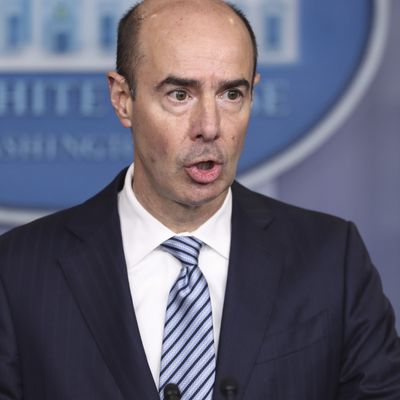
Weeks after Donald Trump’s victory in the 2016 election, the president-elect’s economic adviser Stephen Moore delivered some tough news to House Republicans: “Just as Reagan converted the GOP into a conservative party, Trump has converted the GOP into a populist, working-class party.”
Moore’s remarks — combined with Trump’s sporadic rhetorical support for progressive economic policies on the campaign trail and the increasingly non-college-educated demographic composition of the Republican coalition — fueled much discussion of potential “realignment” in U.S. politics. The GOP would become the party of populism, Democrats would claim the mantle of multicultural cosmopolitanism, and the old left-right binary would become an anachronism.
And then Donald Trump spent his first year in office fighting to throw millions of poor people off health insurance, bestow giant tax breaks on the one percent, and convert the EPA into a wholly owned subsidiary of the American Petroleum Institute.
Since then, Republicans have done little to suggest that they’ve lost interest in selling kleptocratic economic policies wrapped in a shiny package of white middle-class cultural resentments (Stephen Moore, for his part, has spent the past few weeks arguing that Congress’s recently passed corporate bailout is too tough on corporations). Nevertheless, speculation about the GOP’s impending transformation into a workers’ party persists.
Missouri Republican Josh Hawley set off the latest round this week when he introduced the following proposal for protecting workers’ jobs:
Beginning immediately, the federal government should cover 80 percent of wages for workers at any U.S. business, up to the national median wage, until this emergency is over. Further, it should offer businesses a bonus for rehiring workers laid off over the past month. The goal must be to get unemployment down — now — to secure American workers and their families, and to help businesses get ready to restart as soon as possible.
This is modeled roughly off of policies implemented by the Danish and British governments. And it does indeed represent both an improvement on status quo policy and a left-wing deviation from GOP economic orthodoxy.
But it is also less generous than what House Democrats are proposing on the same front, and lacks the support of Hawley’s colleagues.
In other words, Republicans remain far to the right of Democrats on economic policy, and although some GOP senators may be striking more progressive notes in op-eds these days, actual Republican policy-making remains about as reactionary as it’s ever been.
Consider what Labor Secretary Eugene Scalia (son of Antonin) was up to while Hawley was readying his legislation. Late last month, Congress passed a $2 trillion relief package that extended unemployment benefits to gig-economy workers and established a paid sick leave benefit for Americans who work at small businesses. Since then, Trump’s Labor Department has been working diligently to ensure that no U.S. worker has it too easy in the middle of a pandemic and burgeoning economic depression. As the Washington Post reports:
New Labor Department guidance says unemployment benefits apply to gig workers only if they are “forced to suspend operations,” which could dramatically limit options for those workers if their apps are still operating. Other workers also face a high hurdle to qualify for benefits.
The guidance says a worker “may be able to return to his or her place of employment within two weeks” of quarantining, and parents forced to stop work to care for kids after schools closed are not eligible for unemployment after the school year is over. Workers who stay home because they are older or in another high-risk group are also ineligible unless they can prove a medical professional advised them to stop working.
Even as Scalia requires gig workers to meticulously document their unemployment, he’s allowed small businesses to deny their workers paid sick leave without providing any documentary evidence that they can’t afford to do so (the Labor Department does ask such employers to “retain such records for its own files). Meanwhile, Trump’s Labor Department has declined to require employers to implement CDC guidelines for workplace safety:
The CDC has issued recommendations for the public and businesses to follow practices such as social distancing and sanitizing workstations. OSHA could make those guidelines mandatory for all employers or for all essential employees but has not done so.
“Some of the OSHA staff is frustrated they can’t do more to protect workers. They want an emergency standard that would require employers to follow CDC guidelines,” said David Michaels, a George Washington University School of Public Health professor who served as assistant secretary of labor for occupational safety and health in the Obama administration.
Red America remains a boss’s country; some working people just live there.






























